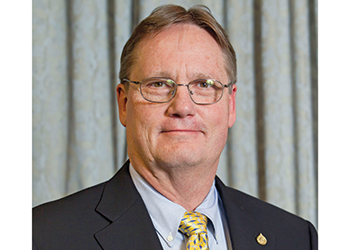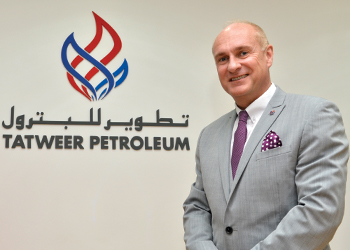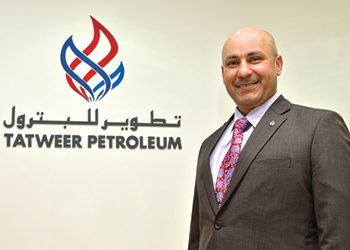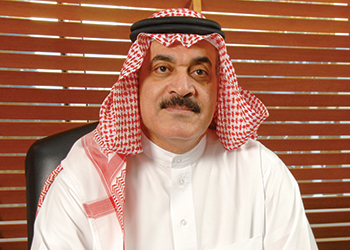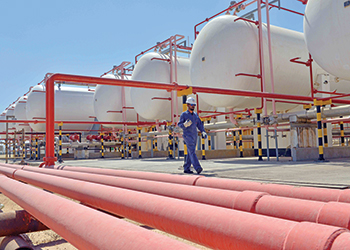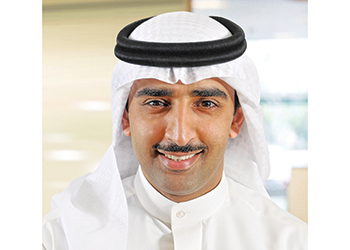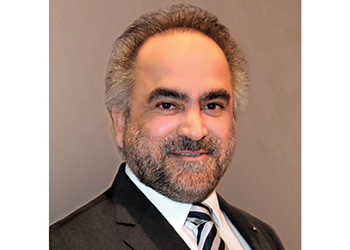
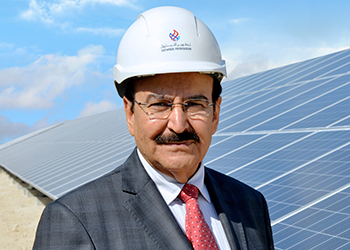 Dr Mirza ... re-vitalising the energy sector
Dr Mirza ... re-vitalising the energy sector
Against the backdrop of weaker hydrocarbons prices, Bahrain is stepping up counter-cyclical downstream investments aimed at boosting energy and economic security
Bahrain is constructing a $600-million liquefied natural gas (LNG) distribution centre which is set to become a hub for Russian LNG in the region, says the kingdom’s Energy Minister Dr Abdul-Hussain bin Ali Mirza.
'We have agreed with Moscow to import this product and we offered to utilise the centre to distribute it in the Gulf,' Dr Mirza says adding: 'Bahrain has agreed with Gazprom to import LNG from Russia and to establish a distribution centre in the kingdom. A special harbour would be ready to operate in the first half of 2018.'
'We have offered that the centre could be a distribution point for Russian LNG, as all Gulf States, except Qatar, need it in the future. Gazprom welcomed the idea,' Dr Mirza adds.
He also confirms that an invitation had been sent to YMG Company, which operates under the jurisdiction of the Federal Agency and the Russian Ministry of Natural Resources, to scan the marine and land borders of the kingdom.
'The company has advanced technologies in the field of geological scanning, especially in shallow waters, and we will soon announce tenders for oil exploration in the area,' says the minister who is the chairman of the National Oil and Gas Authority (noga), which regulates, oversees and develops oil and gas related industries in Bahrain.
It was in December last that Bahrain’s Noga and The Oil and Gas Holding Company (nogaholding) signed project agreements for the development of an LNG receiving and regasification terminal in the kingdom with a consortium of Canada’s Teekay LNG Partners (Teekay LNG), South Korea’s Samsung C&T (Samsung) and the Gulf Investment Cooperation (GIC).
 |
Dr Mirza and other dignitaries at the inauguration of Tatweer’s new 1MW solar plant |
The project will consist of a floating storage unit (FSU), an offshore LNG receiving jetty and breakwater, an adjacent regasification platform, subsea gas pipelines from the platform to shore, an onshore gas receiving facility, and an onshore nitrogen production facility.
It will have an initial capacity of 400 million standard cubic feet per day (mmscfd) (expandable to 800 mmscfd) and will be owned and operated under a 20-year agreement commencing on July 15, 2018.
The project, not including the FSU to be time chartered from Teekay LNG, project management and development, financing and other costs, is expected to cost approximately BD250 million ($658 million), which will be funded through a consortium of regional and international banks.
The project, to be developed on a Boot (Build-Own-Operate-Transfer) basis, will be located in Hidd Industrial area of Bahrain and will help the kingdom meet the increasing demand for gas supplies to satisfy its industrial and urban development.
The LNG terminal will be owned and operated by Bahrain LNG WLL, a new joint venture owned 30 per cent by nogaholding and 70 per cent by the consortium of Teekay LNG, Samsung and the GIC.
The winning consortium selected GS Engineering & Construction as the EPC contractor of the project. Teekay LNG will supply the FSU vessel through a twenty (20) year time-charter to the joint venture.
Dr Mirza says: 'The LNG terminal will form a vital part of the energy infrastructure of Bahrain – it will give the country security of supply that it needs to meet its growth in demand for natural gas to fuel large industrial projects, to generate power and water and for enhanced oil recovery.'
'Gas demand is rising and we foresee that gas demand will increase significantly going forward as new industrial projects in the pipeline are developed. In the period 2011 to 2014, gas demand in Bahrain rose at an average rate in excess of 2.5 per cent per annum and 95 per cent of that increase was sourced from the Khuff gas field. It is imperative that Bahrain provides itself with an option to access competitive and economic gas supplies from the global market. The LNG terminal provides Bahrain with that option, giving it both an insurance policy in case of potential shortages of gas and the ability to supplement domestic gas supplies with gas from LNG,' he says.
Bahrain has also awarded the contracts for the Phase 2 expansion of the Bahrain National Gas Company (Banagas) to Japan’s JGC.
The Banagas expansion project aims to utilise the excess associated gas resulting from increased crude production by Tatweer Petroleum, Dr Mirza says.
The expansion will increase Banagas processing capability by 350 million cubic feet of associated gas. The Banagas 2 project is estimated to cost $600 million.
Bahrain has 14 initiatives for the National Strategy for Energy Sustainability, Dr Mirza says.
Earlier in the year 2015, a landmark gas supply agreement was signed between Bahrain Petroleum Company (Bapco), and Aluminium Bahrain (Alba), which was the largest gas contract that had been signed since the establishment of Noga 10 years ago, to provide gas to Alba’s sixth line, he says.
 |
Pushing the button for the solar plant is Dr Mirza (centre) and Shaikh Abdulla |
'This year also saw the signing of contracts for the new enhanced capacity oil pipeline project, linking Bahrain to Saudi Arabia, which is a big event in the modern history of oil, due to the importance of the new pipeline in supporting our national economy, and answering the sustainability of supply of the crude,' he says.
The new pipeline will provide additional crude to Bapco’s refinery expansion plans, which already include energy efficiency improvements technologies.
'We have also invited IOCs to participate in our deep gas exploration project. We are also planning to import electricity through the GCC grid linking Kuwait, the Kingdom of Bahrain, Qatar, Saudi Arabia, UAE and Oman, so that we conserve the gas that otherwise, would have been required to generate the same quantity of electricity,' says Dr Mirza.
Moreover, Bapco formed a multi-disciplinary energy team a decade ago, to mobilise key energy improvement initiatives.
Also, industry experts have been engaged to perform energy audit, to recommend state-of-the-art technologies, and implement quick hits recommendations.
An Energy Conservation Policy has been developed in-house, with the objective to reduce overall energy consumption, and subsequently, optimise the use of energy, so that natural resources are conserved.
'We are also pursuing a Real-time Energy Management and Optimisation software, to optimise the energy cost and improve energy efficiency of the refinery, in real time,' he says.
The cabinet in 2013 approved the establishment of a sustainable energy unit in Bahrain, which will make a significant contribution to energy conservation and utilisation of renewable energy, in the energy mix, to complement fossil fuel, while promoting clean energy, and improving energy security.
This unit is currently working diligently to develop a Bahrain National Energy Efficiency Action Plan (NEEAP), and to develop a National Renewable Energy Action Plan (NREAP), and to prepare the initial proposal for energy efficiency levels, and labelling requirements for appliances and initial proposal for the Feed-in-Tariff (FIT).
Back in June 2014, Bapco implemented a solar experimental project that produces 5 megawatt (MW) of solar power, and possible expansion thereafter, using Bapco refinery, Awali and University of Bahrain’s roof tops.
Also recently, Electricity and Water Authority awarded a contract to a German firm to produce 2 MW of solar power and 3 MW of wind power, next to Al-Dur power plant. Tatweer Petroleum Company has also recently awarded a contract for a project that meets Tatweer’s energy needs by solar energy.
Meanwhile, Tatweer Petroleum has launched three major projects including a one-MW solar power plant.
Tatweer Petroleum’s new 1 MW solar power plant is able to supply almost 10 per cent of Tatweer’s present power consumption. The solar energy panels connect to Tatweer’s power grid to deliver enough power for its headquarters building. During weekends, and times of low use of the headquarters, the excess power is fed back into the Tatweer power grid for use elsewhere in oil field operations. Meanwhile, Tatweer’s high volume lift electric submersible pump system is an artificial lift method now being used in the Bahrain Field to improve well productivity. The new process uses electrical submersible pumps recently implemented by Tatweer Petroleum to successfully triple oil production from these wells.
 |
Bapco ... on the cusp of momentous changes |
Tatweer Petroleum has produced the first ever extra-heavy oil from the Aruma oil reservoir. The Aruma is the shallowest oil reservoir in the Bahrain Field and contains very viscous oil never previously before exploited. It is being produced and extracted by injecting steam into the viscous oil and then lifting it to the surface with hi-tech submersible electrical pumps. Tatweer has also further successfully completed similar thermal pilots in the underlying Rubble and Mauddud reservoirs. All these enhanced oil recovery (EOR) pilots when expanded will have the potential to produce a major part of Bahrain’s future oil production.
World economy is driven by energy production and usage, which in turn accounts for two third of the world’s greenhouse gas emissions.
'Hence, significant energy management strategies to control the energy expenditures of businesses, is a must. We can reduce environmental risks, by making smarter energy decisions, starting at the production stage,' he says.
Fuel demand will always keep increasing, and so will production. However, what can change is the investment styles and venues, for example, investments in fossil fuels or renewable energy.
The World Bank reported in October 2015, that from the 2nd half of 2016, the crude oil prices will slowly rise until 2025, but will not get to the three-digit level.
'However, there are other different forecasts by other agencies, and we all know that it is very difficult to predict the future oil prices,' he notes.
Analysts warn of longer and tougher market conditions for oil producing countries, and that the next two years, at least, will go in adjusting to an environment of low prices.
'We know that sustainable development is the key to strategic planning for any country, and is dependent on how well nations succeed in energy management, and affects all aspects of development, whether social, economic, or environmental.'
Energy security depends on the ability to react promptly to sudden changes in the supply-demand balance. Energy security is a core element, in any national development plan, and energy management is the vehicle to transport nations to prosperity.
An ideal energy scenario, is where an energy management system, ensures the following: adequate energy sources to fuel the present, without compromising the energy needs of future generations, and without spilling any environmental impact.
'An efficient integrated energy plan accommodates technologies that go beyond sustainability, to other key areas such as generation efficiency. I am sure we will learn much from various energy policy and management perspectives, shared here by energy management experts.'
During the past decades of fast economic expansion, the GCC countries have stressed more on energy diversification than productivity. 'Our high growth rates have come at a high price, an increased share of internal fuel consumption.'
'The fossil fuel exports are still the main source of income for the GCC countries. A balance between economic growth and energy consumption, is critical for sustaining our development programmes. Enhancing energy productivity through efficiency measures, is our best bet for maintaining such balance.
'Energy is central to life. In order to sustain life, we will have to sustain our energy supply, and the focus has to be energy management.
Meanwhile, the Middle East’s vast heavy oil resources indicate that heavy oil will be an important future energy source for the region, says Dr Mirza.
Those companies that have positioned themselves early in the heavy oil business are likely to win in the region, says Dr Mirza.
'Our region has billions of barrels of heavy oil waiting to be extracted and, producing it will be the answer to solving the world’s rising energy demand,' says Dr Mirza.
 |
Although heavy oil costs more than lighter crude to produce, 'our region can do it at a much lower price than many parts of the world'.
Tatweer Petroleum, a joint venture of three strategic partners – Bahrain-based nogaholding, US-based Occidental Petroleum and Abu-Dhabi-based Mubadala Petroleum – has been a pioneering heavy oil venture that has proved successful, he says.
Tatweer focuses on applying EOR techniques in the Bahrain field and is at the very forefront of the industry in thermal recovery of both heavy and light oils from carbonate structures. It has so far implemented 13 pilot projects and dug over 850 wells.
After the first five years of its life, Tatweer Petroleum successfully increased oil production by over 70 per cent and non-associated gas production capacity by 50 per cent.
'We have seen the success of EOR methods being successful in extracting heavy oil in some GCC countries. We will now have to get ready our own heavy oil strategies,' the minister says.
Meanwhile, Bahrain’s new 350,000-barrel per day (bpd) A-B oil pipeline to Saudi Arabia will be operational by the first quarter of 2018. Construction contracts worth $300 million have been signed recently between Bahrain and Saudi Arabia for the same, the minister says.
The new pipeline will replace an ageing 230,000 bpd link and enable Bahrain Petroleum Company (Bapco) expand the processing capacity of its 267,000 bpd Sitra refinery, he said.
A contract to set up a multi-million dollar floating gas terminal off the coast of Bahrain will be awarded shortly. This will allow us to import 400 million standard cubic feet of gas per day (mmscfd), the minister adds.
Going back to heavy oils, the minister says although the Middle East has not generally been regarded as an area of high activity in the realm of heavy oil extraction, in the last 2-3 years, activity in this sector has increased immensely. The region is estimated the contain 970 billion barrels of discovered heavy and extra heavy oil resources, mostly undeveloped.
The heavy oil industry in the Middle East has a different set of challenges compared to other parts of the world due to the heterogeneous nature of the rocks. Technology is the key when tapping into unconventional resources, he points out.
Extra heavy oil is found in all parts of the world. But the challenge is that it is complicated and costly to produce. A lot of investments have been made in the refining sector with an eye on the heavy oil market. Refineries the world over have invested substantially in processing heavy oil and the trend will not change in spite of the oil price scenario obtaining now. Fuel demand will keep on increasing so will the production, he says.
However, what can change are the investment styles and venues. The focus is shifting to more economical production processes. Technology now allows conversion of heavy oil to lighter fuels at the production stage itself, which will considerably reduce production costs. Proven global reserves of conventional oil amount to 1,000 billion barrels – enough for up to 50 years supply at the current rate of production.



















































































